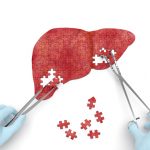 The prognosis for autoimmune hepatitis becomes worse when it is associated with liver cirrhosis and the presence of soluble liver antigen and the liver pancreas antigen (SLA/LP) antibodies. Recent studies done on patients with autoimmune hepatitis show that the first diagnosis of cirrhosis of the liver and the presence of the above mentioned antibodies increase the risk of poor short-term and poor long-term outcomes. The researchers also found that patients diagnosed earlier (in childhood) not only had a higher risk of relapse, but their life expectancy was reduced and they were prime candidates for a liver transplant.
The prognosis for autoimmune hepatitis becomes worse when it is associated with liver cirrhosis and the presence of soluble liver antigen and the liver pancreas antigen (SLA/LP) antibodies. Recent studies done on patients with autoimmune hepatitis show that the first diagnosis of cirrhosis of the liver and the presence of the above mentioned antibodies increase the risk of poor short-term and poor long-term outcomes. The researchers also found that patients diagnosed earlier (in childhood) not only had a higher risk of relapse, but their life expectancy was reduced and they were prime candidates for a liver transplant.
A chronic inflammatory disease, autoimmune hepatitis results in damage to the liver as a result of the body’s immune system attacking healthy liver cells.
Advertisement
According to lead author Dr. Arndt Vogel from Hannover Medical School in Germany, early diagnosis and timely medical therapy can help patients with autoimmune hepatitis have a good prognosis. But if the disease is not detected early, it can end up with severe symptoms and complications. Dr. Vogel explains that their study examines the genetic and clinical features of remission, relapse and liver transplant-free survival in patients with autoimmune hepatitis.
Details about the study
For the study, the team analyzed 264 patients with autoimmune hepatitis who were treated at Hannover Medical School between 2000 and 2014, and 399 patients without autoimmune hepatitis. The researchers did not take into account subjects with viral hepatitis, haemochromatosis, Wilson’s disease and alcoholic and non-alcoholic liver disease.
At the end of the study, the researchers found that in the patients with SLA/LP antibodies the overall survival and liver transplant-free survival was significantly reduced. And the patients with a childhood diagnosis of autoimmune hepatitis had an increased risk of relapse, higher risk of needing a liver transplant and a reduced life expectancy. And in the 25 percent of patients with whom liver cirrhosis was apparent at first diagnosis, the risk of survival was poor and the need for liver transplantation was high.
Other risk factors of autoimmune hepatitis
 Besides cirrhosis of the liver, there are other factors that could influence and increase the risk of autoimmune hepatitis. They include:
Besides cirrhosis of the liver, there are other factors that could influence and increase the risk of autoimmune hepatitis. They include:
Being female – Although autoimmune hepatitis can occur in both men and women the incidence of occurrence is higher in women.
Age – While type-1 autoimmune hepatitis is not associated with age and can occur any time, type-2 autoimmune hepatitis usually affects young females.
Infections – A bacterial or viral infection may pave the way for autoimmune hepatitis.
Medications – Certain medicines like the antibiotic, minocycline, and the cholesterol medication, Lipitor, have been known to be risk factors for autoimmune hepatitis.
Heredity – The predisposition for autoimmune hepatitis to run in families is backed by historical evidence.
Autoimmune disease – People who already have an autoimmune disease may be more likely to develop autoimmune hepatitis.
Types of autoimmune hepatitis
Depending on the presence of antibodies in the blood, there are three types of autoimmune hepatitis:
- Type-1 autoimmune hepatitis has antinuclear and smooth muscle antibodies.
- Type-2 autoimmune hepatitis show liver-kidney-microsomal antibodies.
- Type-3 autoimmune hepatitis displays SLA/LP antibodies.
Of the three, the most common type in North America is type-1 autoimmune hepatitis. As mentioned before, it can occur at any age; however, it most often starts at a young age, during and immediately after the teenage years. Females account for about 70 percent of type-1 autoimmune hepatitis patients. Most people with type-1 autoimmune hepatitis commonly have other autoimmune disorders.
Type-2 autoimmune hepatitis is not as common as its type-1 cousin and occurs more often in children than adults. Like type-1 patients, type-2 patients may also have other autoimmune disorders.
Treatment for autoimmune hepatitis
 For both type-1 and type-2 autoimmune hepatitis, the aim of the treatment is to deter the body’s immune system from attacking the liver, and in the process slow down the progression of the disease.
For both type-1 and type-2 autoimmune hepatitis, the aim of the treatment is to deter the body’s immune system from attacking the liver, and in the process slow down the progression of the disease.
The common medications and treatments used to get your immune system back on track are:
- Prednisone
- Azathioprine (Azasan, Imuran)
- Other immunosuppressants: If the patient does not respond to prednisone or azathioprine, the next step would be stronger immunosuppressants like mycophenolate (CellCept), cyclosporine (Neoral, Sandimmune) or tacrolimus (Prograf).
- Liver transplant: If the patient does not respond to the stronger immunosuppressants and liver cirrhosis sets in, a liver transplant is the next option.
Living with autoimmune hepatitis
 As one can expect, living with a chronic liver disease is not easy. The best way is to find methods to cope with the symptoms and overcome the difficulties that the disease can bring about. To manage the disease successfully it is important to:
As one can expect, living with a chronic liver disease is not easy. The best way is to find methods to cope with the symptoms and overcome the difficulties that the disease can bring about. To manage the disease successfully it is important to:
- Learn about the condition – The more people understand what’s going on in their body, the more active they can be in their own care. The American Liver Foundation has a lot of information on its website.
- Take care – Eating well, exercising and getting enough rest can help a patient feel better. Avoiding drinking alcohol, and check with your doctors before taking any new medications to help in the long run.
- Get help – Interacting socially with friends and family is a step forward. And being open to help and suggestions has a lot of benefits.
- Seek support – Strong relationships can play an important role in helping hepatitis patients maintain a positive attitude. Finding a support group can be helpful.
From the study mentioned at the start of this article, it’s clear that autoimmune hepatitis patients diagnosed in childhood, those that present with cirrhosis at the time of initial diagnosis or who have SLA/LP antibodies, have poor clinical outcomes. It’s important that these patients are kept under close surveillance and given all the support and help they can get to cope with the disease. For more suggestion on how to help these patients visit the American Liver Foundation’s website at http://www.liverfoundation.org/ or call 800-465-4837.
Related reading:
Advertisement
Liver Cirrhosis: Causes, symptoms and prevention
When we discuss liver diseases many of us immediately think of alcohol or drug use. In reality there are actually over 100 different types of liver disease which can impact the function of the liver. Continue reading…
Fatty liver and diabetes risks for liver fibrosis
Non-alcoholic fatty liver disease occurs when fat accumulates in the liver. This can occur in individuals who don’t drink or who moderately drink alcohol. In some people non-alcoholic fatty liver disease causes no symptoms or complications. Continue reading…
Sources:
http://www.eurekalert.org/pub_releases/2015-09
http://www.mayoclinic.org/diseases-conditions/autoimmune-hepatitis/basics/risk-factors
http://www.niddk.nih.gov/health-information/health-topics/liver-disease/autoimmune-hepatitis
http://www.mayoclinic.org/diseases-conditions/autoimmune-hepatitis/basics/treatment
